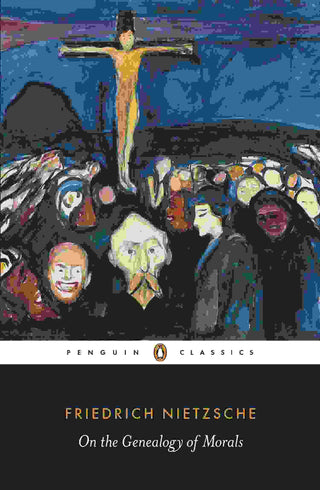On the Genealogy of Morals
- Unit price
- / per
-
Author:NIETZSCHE Friedrich Wilhelm
-
ISBN:9780141195377
-
Publication Date:November 2013
-
Edition:1
-
Pages:167
-
Binding:Paperback
-
Publisher:Penguin Books
-
Country of Publication:


A Back Order button means that we don’t have the book in stock at our store. It may already be on order – or we can order it for you from a publisher or distributor at no additional cost.
As we source items from around the globe, a back-order can take anywhere from 5 days to several weeks to arrive, depending on the title.
To check how long this might take, you’re welcome to contact us and we can provide an ETA or any other information you need. We recommend checking the timeframe before committing to an online order.
On the Genealogy of Morals
- Unit price
- / per
-
Author:NIETZSCHE Friedrich Wilhelm
-
ISBN:9780141195377
-
Publication Date:November 2013
-
Edition:1
-
Pages:167
-
Binding:Paperback
-
Publisher:Penguin Books
-
Country of Publication:
Description
Adding product to your cart
You may also like
A Back Order button means that we don’t have the book in stock at our store. It may already be on order – or we can order it for you from a publisher or distributor at no additional cost.
As we source items from around the globe, a back-order can take anywhere from 5 days to several weeks to arrive, depending on the title.
To check how long this might take, you’re welcome to contact us and we can provide an ETA or any other information you need. We recommend checking the timeframe before committing to an online order.
You may also like
You may also like
-
The companion book to Beyond Good and Evil, the three essays included here offer vital insights into Nietzsche's theories of morality and human psychology. Nietzsche claimed that the purpose of The Genealogy of Morals was to call attention to his previous writings. But in fact the book does much more than that, elucidating and expanding on the cryptic aphorisms of Beyond Good and Evil and signalling a return to the essay form. In these three essays, Nietzsche considers the development of ideas of 'good' and 'evil'; explores notions of guilt and bad consience; and discusses ascetic ideals and the purpose of the philosopher. Together, they form a coherent and complex discussion of morality in a work that is more accessible than some of Nietzsche's previous writings.
-
-
Author: NIETZSCHE Friedrich WilhelmISBN: 9780141195377Publication Date: November 2013Edition: 1Pages: 167Binding: PaperbackPublisher: Penguin BooksCountry of Publication:
The companion book to Beyond Good and Evil, the three essays included here offer vital insights into Nietzsche's theories of morality and human psychology. Nietzsche claimed that the purpose of The Genealogy of Morals was to call attention to his previous writings. But in fact the book does much more than that, elucidating and expanding on the cryptic aphorisms of Beyond Good and Evil and signalling a return to the essay form. In these three essays, Nietzsche considers the development of ideas of 'good' and 'evil'; explores notions of guilt and bad consience; and discusses ascetic ideals and the purpose of the philosopher. Together, they form a coherent and complex discussion of morality in a work that is more accessible than some of Nietzsche's previous writings.-
Author: NIETZSCHE Friedrich WilhelmISBN: 9780141195377Publication Date: November 2013Edition: 1Pages: 167Binding: PaperbackPublisher: Penguin BooksCountry of Publication:
-



